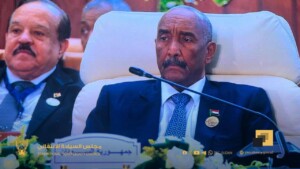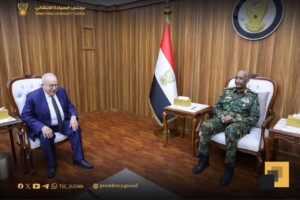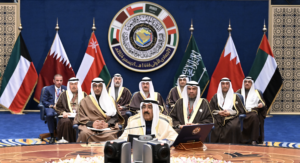Resistance Committees walk out of talks on Sudan parliament
The Resistance Committees in Khartoum met with the Forces for Freedom and Change (FFC) regarding the formation of the Legislative Council in Khartoum on Wednesday, however the Resistance Committees subsequently withdrew from the meeting, citing disagreements with the agenda.
 Members of Resistance Committees leave the meeting with FFC on the formation of the new parliament (Social media)
Members of Resistance Committees leave the meeting with FFC on the formation of the new parliament (Social media)
The resistance committees in Khartoum met with the Forces for Freedom and Change (FFC) regarding the formation of the Legislative Council in Khartoum on Wednesday, however the grassroots committees subsequently withdrew from the meeting, citing disagreements with the agenda.
The meeting began with a briefing of FFC chairman and former president of the Sudanese Congress Party, Ibrahim El Sheikh, regarding the distribution of seats in parliament, as agreed in the Juba Peace Agreement between Khartoum and the Sudan Revolutionary Front (SRF) rebel alliance on October 3.
The two parties agreed in Juba that the now 18 Sudanese states will be restructured into regions that will be represented by 60 per cent in the parliament, distributed according to population density. 40 per cent of the 300 seats is to be allocated to women. The rebel signatories of the peace agreement will be represented in the Transitional Legislative Council by 25 per cent, which equates to 75 seats.
El Sheikh said that the FFC agreed to conduct wide consultations with the resistance committees and other civil society groups, stressing the importance of establishing a legislative council for the country’s democratic transition process.
He said that they already discussed the formation of the legislative council with the RSF rebel alliance, who would preside over the council and chair the various committees.
Walk-out
Other members of the FFC and rebel leaders addressed the meeting as well, before the representatives of the resistance committees read a statement announcing their withdrawal from the meeting, because of the late notification and their disagreement with the meeting’s agenda.
In a statement, the resistance committees in Khartoum declared their rejection of the meeting on the Legislative Council and criticised the way in which the arrangement for discussing a vital issue such as the Legislative Council was made. They were informed about the meeting by telephone on Tuesday evening.
The grassroots committees active in the neighbourhoods of Khartoum accuse the FFC of “seeking to abort what is left of the revolution by deliberately excluding the Resistance Committees from meetings on the Legislative Council”.
The statement further said that “the methodology of the Resistance Committees in dealing with revolutionary issues is to keep to the rules, and listen to the views of all revolutionaries”.
It described the government’s handling of “important issues” such as the economic conference and the peace issue as “superficial and condescending to listen to the voice of the street”.
The resistance committees declared their full readiness to defend the revolution and provide corrections, stressing that the legislative council is the safety valve of the revolution. Before they left the meeting, they chanted slogans: “You parties, the suffering is enough” [ya ahzab, kifaya azab] and “The legislative council must be a revolutionaries council”.
Radio Dabanga’s editorial independence means that we can continue to provide factual updates about political developments to Sudanese and international actors, educate people about how to avoid outbreaks of infectious diseases, and provide a window to the world for those in all corners of Sudan. Support Radio Dabanga for as little as €2.50, the equivalent of a cup of coffee.












 and then
and then